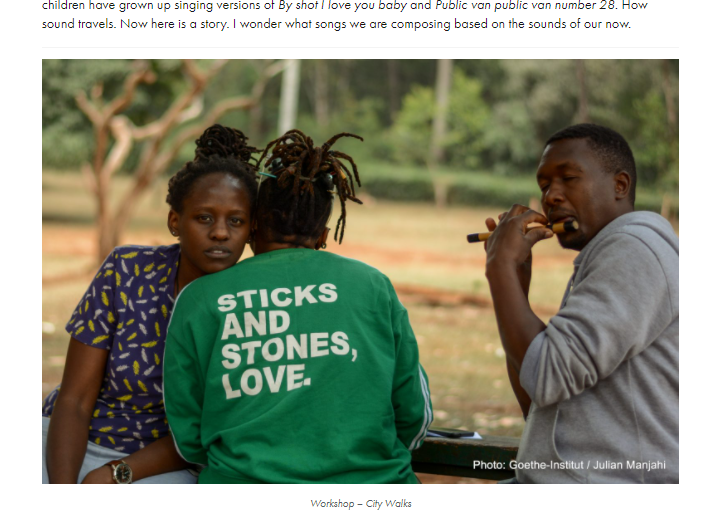
Sound to write about
- ,
- , Sophia Bauer
In the last year a few journalists and writers reached out to us to speak about the project. I will highlight passages from the interviews but it is definitely worth it to read them in full.
Here you’ll find the article and interview by Wanjeri Gakuru in the People’s Stories Project, speaking with team SON and Lutivini Majanja, a participant in the City Walks workshop. The excerpt below is a question and an answer (by Lutivini) that I find very nice:
WG: Why is it important that this sound archive exists and continues to expand?
LM: I think this archive is as vital as photographs and written text. There will always be something to learn from them. There is memory and story embedded in these recordings. It’s interesting to note how the sounds of places change over time and how this changes our emotional connection with these places. I think about how generations of Kenyan children have grown up singing versions of By shot I love you baby and Public van public van number 28. How sound travels. Now here is a story. I wonder what songs we are composing based on the sounds of our now.
This is an interview on hyperlinkhex, a blog by music writer S. David which he did with Raphael Kariuki from SON-team. Here’s an interesting out-take:
SD: What do you feel the role of noise/sound in African urban life is?
RK: This is something we are learning about as we build the archive, so can’t really give a simple answer. It’s a complex, fascinating question to consider. Sound of Nairobi exists on the premise that there is knowledge in sound that enriches societies and individuals. It promotes an alternative to traditional written archives which hold the universally recognized power of knowledge production. What this sonic knowledge exactly is and how we make use of it is there to find out. Let’s talk about this in about a year’s time!
With Nicklas Hallén I did an interview for his African Street Literature Blog. It was about SON in general but also about the Sounds Like A Pandemic? project specifically. This is an excerpt I find very relevant for the archive:
NH: How do you select the particular spots where you make your recordings? Do you typically decide on a place beforehand or do you switch on your equipment when something interesting happens?
SB: First, we work with teams of about a dozen people who volunteer for sound walks. Before the sound walks, we have workshops where we share basic concepts of acoustic ecology investigation and practice. We do not direct the people to record specific places. Everyone is free to decide on the sounds of places and situations that they judge to be worthwhile, a useful representation of the city at that moment in time and contribute them to the archive.
The beautiful idea about Sound of Nairobi is that everyone can contribute their very subjective perspective and make it part of history. This subjective ear is an integral part of the archive. We do not want to create the illusion of an objective collection of sound. It rather reflects and validates the many different people with their uniquenesses that contribute to this archive.
And just recently Lutivini Majanja published an article on Soundoflife.com, a KEF project. In this passage she speaks about the changing sounds she realized during the recording sessions for Sounds Like A Pandemic?:
As one of the writers participating in these recording sessions, my first observation of what stands out between 2019’s recording experience and this year’s recordings is that street vendors who chant their wares, now include masks and sanitisers in the list of items on offer. “Masks hamsini” masks for fifty shillings, is for now a fixture wherever there are hawkers. I wonder when and if this phrase will peter out. In April there was a sudden absence of loud music from busy shops and stalls at the start of the pandemic while at residential areas there was a surge of early returns from work because of the 7:00 p.m. curfew.
All the interviews/articles are worth a full read. Here’s the list:
A Sonic City – Wanjeri Gakuru on People’s Stories Project
A conversation with Sound of Nairobi’s Raphael Kariuki – S. David on hyperlinkhex
Interview with Sophia from Sound Of Nairobi – African Street Literature
Rediscovering the sounds of Nairobi during a global Pandemic – Lutivini Majanja on Soundoflife.com/aKEFproject
Enjoy!
© 2020 SOUND OF NAIROBI
